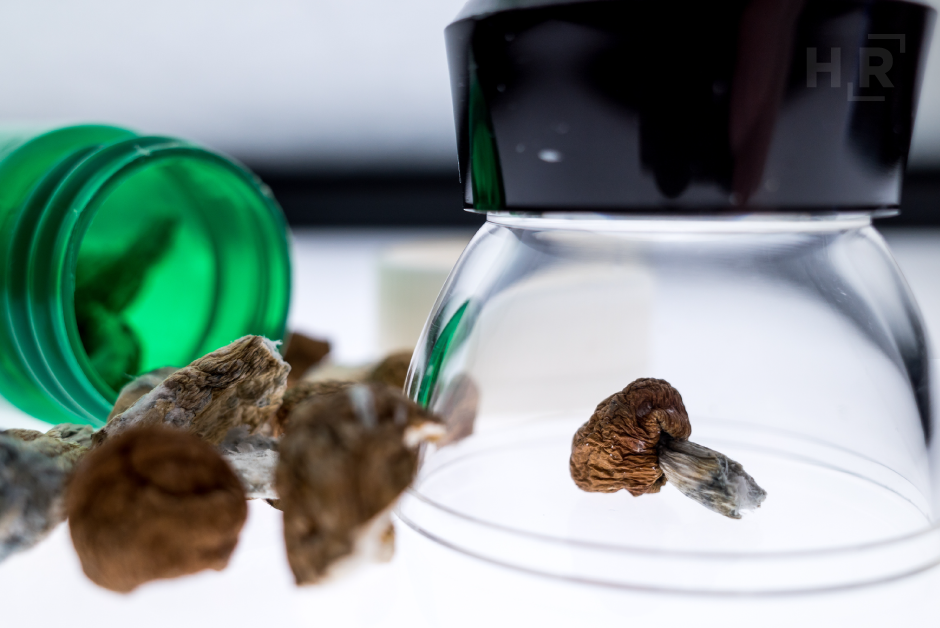The Impacts of Hallucinogenic Psilocybin on the Workplace
Psilocybin is gaining ground as a promising therapeutic treatment, with several states & local jurisdictions considering legalization. But employers need to think carefully about the implications.

In recent years, psilocybin, the active compound in magic mushrooms, has gained increasing attention for its potential therapeutic benefits. As a result, the legal status of psilocybin is evolving, with several states and local jurisdictions decriminalizing or legalizing its use for medical and recreational purposes. This raises several questions for employers, such as:
What are the legal implications of psilocybin use in the workplace?
How can employers protect their employees and their businesses from the potential risks of psilocybin impairment?
What are the best practices for developing and implementing employer policies on psilocybin use?
The Legal Landscape
Psilocybin remains a Schedule I controlled substance under federal law, meaning that it has a high potential for abuse and no currently accepted medical use. However, several states and cities have decriminalized or legalized psilocybin for medical and/or recreational use. As of the date of this publication, psilocybin has been legalized or decriminalized in the following states and localities:
Legalized States:
Decriminalized Localities: California: Arcata, Berkeley, Oakland, Santa Cruz, San Francisco
Colorado: Denver
Maine: Portland
Massachusetts: Cambridge, Easthampton, Northampton, Somerville
Michigan: Ann Arbor, Detroit, Ferndale, Grand Rapids, Hazel Park, Washtenaw County
Minnesota: Minneapolis
Washington: Jefferson County, Port Townsend, Seattle
While Colorado and Oregon have legalized psilocybin, protecting its users from discrimination, it is important to note that decriminalization in other localities does not mean that psilocybin is legal to use or possess. It simply means that the lowest law enforcement priority is given to psilocybin-related offenses.
In addition to the states and localities listed above, several other states have introduced legislation to decriminalize psilocybin, including California, Connecticut, Hawaii, Maryland, Minnesota, Missouri, New Jersey, New York, Rhode Island, and Vermont.
Workplace Implications
Psilocybin use can impact the workplace in several ways, including:
Impairment: Psilocybin use can lead to altered states of consciousness and impaired cognitive function. This can raise safety concerns, particularly in safety-sensitive roles.
Productivity: Employees under the influence of psilocybin may experience reduced productivity and difficulties concentrating, which can affect their job performance.
Mental Health: While some studies suggest that psilocybin may have therapeutic effects on mental health, it's essential for employers to navigate the delicate balance between personal well-being and workplace productivity.
Dr. Todd Simo, chief medical review officer at HireRight, a global provider of background screening and drug testing solutions, notes, “From a psychological perspective, psilocin causes hallucinations and an inability to discern fantasy from reality. Both panic reactions and a psychotic-like episode also may occur, particularly at high doses. Psilocin also has physical effects which include nausea, vomiting, muscle weakness, and lack of coordination. When a person uses psilocybin, physical and psychological consequences start approximately 20 minutes after ingestion and last approximately 6 hours and are not compatible with being on the job.”
Testing Options
There are a few different ways that employers can test for psilocybin impairment. However, it's important to note that testing for psilocybin is more complex and expensive than standard drug tests.
Behavioral Observation: Supervisors and colleagues can be trained to recognize signs of impairment in an employee's behavior, such as unusual or erratic actions.
Urine Tests: Standard urine tests may not detect psilocybin, but they can uncover other substances that might be used in combination with psilocybin, such as cannabis or amphetamines.
Oral Fluid Tests: Some specialized tests can detect recent psilocybin use in oral fluid samples. However, these tests are not yet widely available.
Dr. Simo reminds employers that standard drug tests offered for employment purposes do not include psilocybin/psilocin as an analyte. “A person can be actively hallucinating due to using this drug and still have a negative drug test when a standard panel is used; employers can set up panels that include psilocin,” said Simo.
Employer Policies
When developing and implementing policies on psilocybin use, employers should consider the following factors:
The legal status of psilocybin in their jurisdiction.
The nature of their business and the risks associated with psilocybin impairment.
The needs of their employees, including those with disabilities.
Of note, despite legalization in Colorado and Oregon, and decriminalization other jurisdictions, employers are not explicitly prohibited from taking adverse employment actions against workers who use psilocybin. Employers should consult with an attorney to ensure that their policies are legally compliant.
Best Practices
Here are some best practices for developing and implementing employer policies on psilocybin use:
Be clear and concise. The policy should clearly state that psilocybin is a prohibited substance and that employees may be disciplined or terminated for using it.
Be consistent. The policy should be applied fairly and consistently to all employees.
Be reasonable. The policy should be tailored to the specific needs of the business and its employees.
Provide training. Employees should be trained on the signs and symptoms of psilocybin impairment and the company's policy on psilocybin use.
Create a safe and supportive environment. Employees should feel comfortable reporting suspected psilocybin use without fear of retaliation.
Parting Thoughts
The evolving legal landscape and our growing understanding of psilocybin present new challenges for employers. By developing and implementing well-thought-out policies, employers can protect their employees and their business from the potential risks of psilocybin impairment.
Release Date: November 9, 2023

Alonzo Martinez
Alonzo Martinez is Associate General Counsel at HireRight, where he supports the company’s compliance, legal research, and thought leadership initiatives in the background screening industry. As a senior contributor at Forbes, Alonzo writes on employment legislation, criminal history reform, pay equity, AI discrimination laws, and the impact of legalized cannabis on employers. Recognized as an industry influencer, he shares insights through his weekly video updates, media appearances, podcasts, and HireRight's compliance webinar series. Alonzo's commitment to advancing industry knowledge ensures HireRight remains at the forefront of creating actionable compliance content.